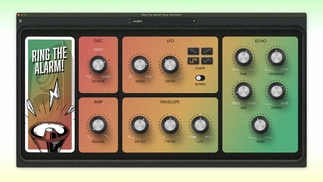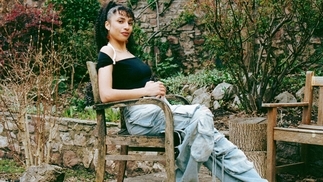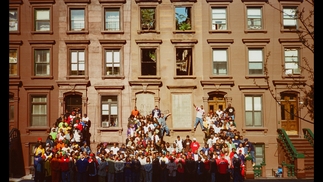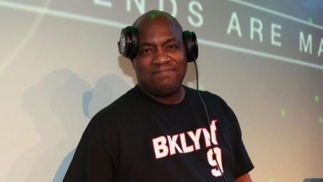MO KOLOURS: NO MAN IS AN ISLAND
We're digging the psychedelic hip-hop and dub funk vibes of Mauritian-English Mo Kolours...
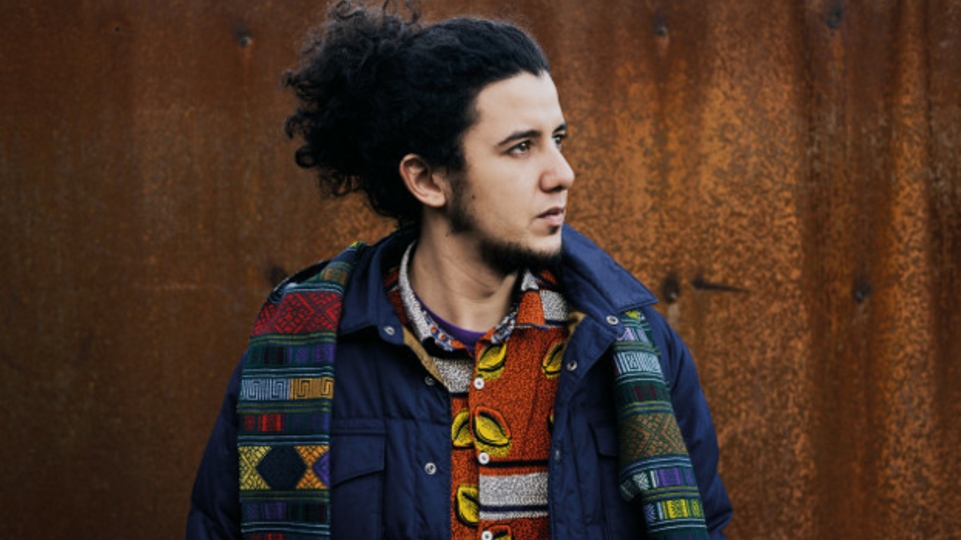
“I think with electronic music and modern day ideas about mastering and all these processes, people want to get rid of the background noise and the life, the depth of stuff, they want to clean it all up, and just have air,” believes Mauritian-English producer Mo Kolours. “But there's no such thing for me. It feels richer when there's more in there. There's stuff going on always in the background, I might use a sample and delete it, or the rhythm might be based on a sample, that's not there, but it's there really, the skeleton of it, the ghost of the song.”
It's rawness and vitality that the London-based Mo Kolours, real name Joseph Deenmamode, specialises in. He frowns on the pristine production of bland dance. Mo's music buzzes with life, a rich gumbo of influences and sound sutures.
Exotic, heady and loaded with funk. Built from samples, percussion hits, humming electronic basslines, and a balance between lilting, mellow reggae style vocals and half-rapped, half-spoken tones, it's part hip-hop, part funk, part dub, part electronic, but mostly in a world of its own.
'Banana Wine' from his 'EP2' on One-Handed Music — arguably the first tune to get him noticed — was a zonked crawl through a fug of acrid psychedelic smoke, a catatonic beat and shimmers of strange, numinous harp-like instrumentation, bonded by Mo's ode to the obviously intoxicating brew of the title. But his first album, 'Mo Kolours', out now, expands this vision into a celluloid view of London through wise eyes.
'Little Brown Dog' is a gorgeous bittersweet loop of steel drums, skittering boom-bap claps and bass rumbles, the lush sung melody the song's focal point, the lyric, according to Joseph, an adaptation of an old folk song.
'Mike Black', is a 4/4 thump of ethereal synth pads, deep funk b-lines and cool voxes, tinkling aquatic keys and live congas, while 'Straight Ruk' could be Fly Lo on some smoked out, windows down, wonky shit, its unquantised lolloping rhythm and weird electronic bleeps a tonic to the soul.

DUAL IDENTITY
Inherent to his sound is his dual identity. That of his father's Mauritian culture and Mo's life moving around the UK, from the North to the West Country, before settling in London for the past 10 years. Mauritius, a large island situated in the Indian Ocean off the south-east coast of Africa, has a vibrant composite of cultures partly due to its geographical position, with folk originally from India and China, peoples from the African mainland and a considerable European influence due to its being colonised by various nations.
London where he's lived for a long while is culturally and musically as polymorphous.
This baffling blend of influences and cultures bleeds into his music, its scatty jumping from one style to another, its combination of all manner of vibes in one track, alchemically merging into the Mo Kolours style.
“My whole kind of existence is a bit of hotch-potch, a bit of a mix,” Joseph says. “That's something that, if you can call it an identity, that is part of my identity, but it's kind of the opposite of an identity, saying that everything is welcome.”
Going to Mauritius as a child had a big impact on the young Joseph. Though his experience of the island is limited, it was enough to make him want to investigate the culture further.
“Just having a parent that's from a country, you get an insight to the culture,” he states. “I have an interest myself in the rawness of the music. I was lucky to go out there as a kid and experience these things. Did it make an impression? Yeah it did, thinking about my father and my grandfather in that place, and getting out of there, the trials and tribulations they had to put up with, and just the beauty of the island, the rawness reflected in the music.”
Drums are always at the forefront of his sound. Percussive hits are crucial to his groove and have been an obsession ever since he was a kid, later culminating in a love of the breakbeat loops of classic hip-hop, cultivated at the genre's early '90s height and later via other drum beats he's discovered from digging deep for obscure samples to shade his productions.
“From being a child I've been obsessed with drums and the idea that you can hit something, and the variations in rhythm seem infinite, it's such a heavyweight instrument but there's no need to feel like you have to learn it, it's so simple, even though there's a stigma attached to learning drums in the society we're in,” he opines.
“But in a lot of societies there's no sense that you need to learn it, you just hit this thing and it makes a noise. For me it's a special thing, drums, the origin of everything, it links to the heartbeat of humanity.”
The live, spiritual connection of Mauritian sega music is something he's become fascinated by — itself crucially driven by the drum — and glimpses of its raw majesty can be discerned in-between the beats, as well as in the hazy island atmospheres evoked on the album. But for those who don't know, what actually is sega?
“It's my people's music. The Creole people of Mauritius brought the memory of the [African] mainland's music to the island and tried to keep it alive through these little ceremonies. It's drum, dance and singing, telling stories, letting go of your sorrows, kind of like blues music, all music of people who have been taken from their original land, and they're trying to rehash it and it's got this mournful feeling to it.
But it's also got a happy feeling cos it's the only time they can enjoy themselves. It's got this incredible energy. Often these musics take on a more refined feel, but sega seemed to stay with this rawness for longer.”
STORYTELLING
The storytelling that sometimes feeds into Sega music is a key component of Mo Kolours' tracks. Many of his tunes are miniature vignettes. Short reflections on diverse subjects that steer clear of cliched bullshit love songs in favour of something more ear-catching.
'Play it Loud' lampoons the silly excesses of acquisitive gangster rap, replacing the boasts about expensive rides that provide the subject matter of so much mainstream hip-hop with exhortations to bump the fizzing bass and fat beat of the track in your “Datsun Sunny, Morris Minor, play it louder in your Lada”.
It's a humorous subversion that came about, Mo says, because “People's obsession with trinkets and pretty things, describing how they love stuff, can be quite funny at times”. 'Natural Disaster Wishlist' too, though initially appearing an ominous warning about climate change turns out to be something more multi-layered when you listen closer to its Book of Revelations-style fire and brimstone apocalyptic prophecies, where Mo mentions such preposterous plagues as “killer aphids”, giving us a hint that it should be taken with a pinch of salt.
“It's kind of like the old ideas of fear-mongering to control the people, in the old days, the biblical days. It gets me wondering about how much all of these ideas are just fear-mongering and worrying people too much.”
The dichotomy between serious subject matter and humour, the complex shades between dark and light, is a juxtaposition Mo says is important in his music. Check out the tune 'Child's Play' where the initial ambient sound of kids' voices playing in the street and the innocuous melody give way to him talking about street violence and young people killing each other over gang loyalties, inspired by dark scenes he witnessed living in Peckham, South London.
“It's easy to hide sometimes from obvious realities to do with concepts. It's easy to point out the nice version,” he reflects. “For me it's important to draw together a lot of emotions, in life it's not as easy as just being happy or just being sad, there's always this in-between ground, it's something that I'm striving to do when I'm making stuff, hard drums but then a beautiful sample, that's a bit too beautiful for the drum, some grittiness where it seems really sparkly and lovely in one sense. The emotions that you might go through as you listen.”
'Mo Kolours' is a record that is going to and deserves to get a lot of attention. There's more life and soul here than in a million dry tech house tunes. And he's promising another mini album already for later this year. Time to open your eyes — and ears — to the vivid Kolours...
THE LOOP DIGGER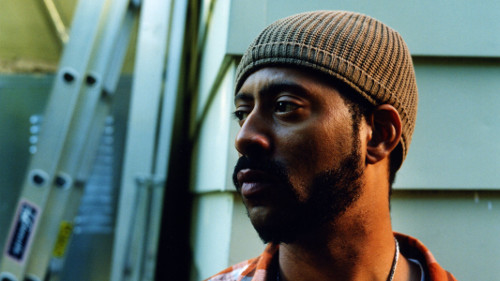
Mo Kolours' music owes a debt to the freewheeling, sampladelic grooves of hip-hop production genius Madlib. Here he talks about sampling and what makes the Californian beatmaker such an influence...
“[I'm] trying to find samples that no one else has used. For me it's just become an interest, and I've found some of the most beautiful music I've ever heard through just trying to find the most obscure music to sample. I've ended up with collections of stuff that I don't sample but it's just incredible, stuff from round the world.”
“Madlib's a very strong inspiration, someone who seems to value understanding the history of music, pointing that out in his music, showing the parallels between things that seem miles apart but drawing them together to show their similarities. Most people's idea of what hip-hop is, is silly kids chatting shit, but I think someone like Madlib brings an intelligence to the whole genre.”
